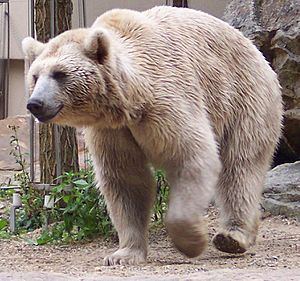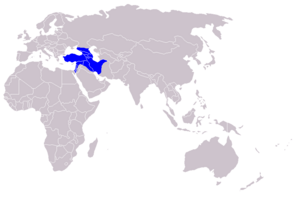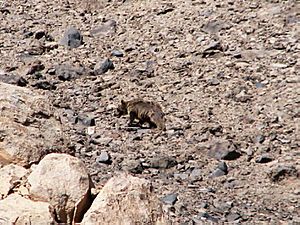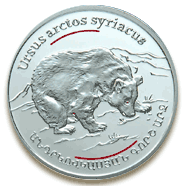Syrian brown bear facts for kids
Quick facts for kids Syrian brown bear |
|
|---|---|
 |
|
| Scientific classification | |
| Genus: |
Ursus
|
| Species: |
arctos
|
| Subspecies: |
syriacus / arctos
|
 |
|
| Distribution | |
| Synonyms | |
|
caucasicus Smirnov, 1919 |
|
The Syrian brown bear (Ursus arctos syriacus or Ursus arctos arctos) is a type of brown bear found in the Middle East. It's known for being a bit smaller than other brown bears.
Contents
About the Syrian Brown Bear
The Syrian brown bear is a subspecies of the larger brown bear. Scientists have studied their genes and found that all brown bears in the Caucasus region are closely related to the Eurasian brown bear. This means the Syrian brown bear is part of that larger group.
What They Look Like
Syrian brown bears usually have very light brown or straw-colored fur. The hair on their shoulders (called the withers) is longer and often a different shade. Sometimes, this looks like a dark stripe down their back. Bears living in higher, colder places often have lighter fur. Their legs are usually darker than the rest of their body.
One special thing about them is that they are the only known bears in the world with white claws! They are also quite small for a brown bear. Adult males have skulls that are about 30 to 40 centimeters (12 to 16 inches) long. These bears can weigh up to 250 kilograms (550 pounds). From their nose to their tail, they measure about 101 to 140 centimeters (40 to 55 inches).
In the past, some people thought that bears in the Caucasus mountains were a mix of Eurasian and Syrian brown bears. However, genetic studies have shown that all bears in the Caucasus are actually Eurasian brown bears.
Where They Live
Historically, brown bears lived across the Middle East, from Turkey to Turkmenistan. Today, they are no longer found in Jordan, Israel, or the State of Palestine. They now only live in Turkey, Iran, and Iraq.
In Syria, bear tracks were seen in the snow in the Anti-Lebanon Mountains in 2004. This was the first time in 50 years! More tracks were seen there again in 2011.
In Turkey, these bears live in different types of forests. These include Mediterranean forests, deciduous forests (where trees lose their leaves), and conifer forests (with trees like pines and firs). They live at elevations from about 500 to 2,700 meters (1,600 to 8,900 feet) above sea level.
In Iran, Syrian brown bears are found in the Central Alborz Protected Area and the Zagros Mountains. They prefer higher places and areas with good access to water.
What Threatens Them
Syrian brown bears face several dangers. In Turkey, their homes are being broken up by large-scale forest clearing. Their habitat is also being damaged. People sometimes harm bears if they damage beehives or farm animals.
Some local people in the Black Sea region illegally hunt bears for their fat, believing it has medicinal uses. Bears can also be accidentally killed during hunts for wild boar or by traps set for other animals like red deer, roe deer, wolf, or lynx.
In Culture
The Syrian brown bear is believed to be the bear mentioned in the Bible. The Bible often talks about how protective a mother bear is of her cubs. For example, in 2 Kings 2:23-25, it mentions bears attacking 42 children who were making fun of the prophet Elisha.
A famous Syrian brown bear named Wojtek lived from 1942 to 1963. He was bought by Polish soldiers in Iran during World War II. Wojtek became their company mascot! He was even given the rank of private and later corporal. He helped the soldiers by carrying heavy artillery shells. After the war, Wojtek lived at the Edinburgh Zoo in Scotland, where he was very popular. His service is remembered in both Scotland and Poland.
See also
 In Spanish: Oso pardo sirio para niños
In Spanish: Oso pardo sirio para niños
 | Selma Burke |
 | Pauline Powell Burns |
 | Frederick J. Brown |
 | Robert Blackburn |



